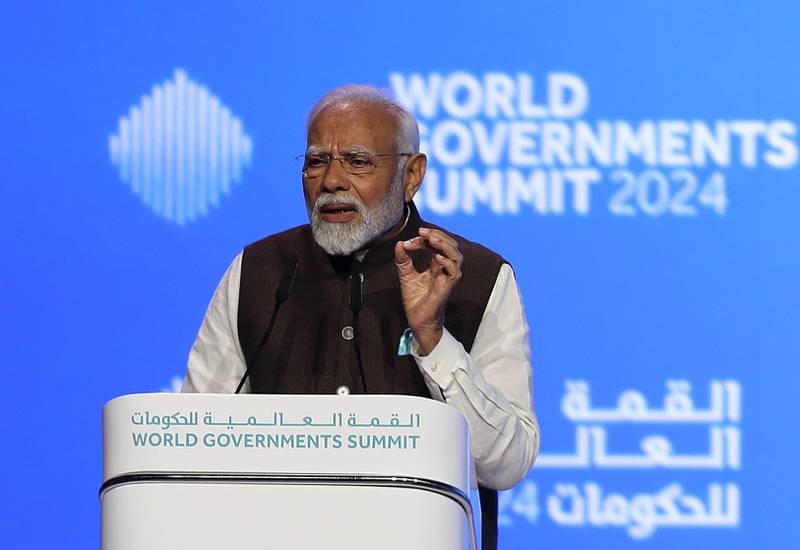Indian Prime Minister Narendra Modi took to the stage at the Dubai World Governments Summit on Wednesday to call for a “global protocol” that can deal with artificial intelligence and cryptocurrency.
In an address on the summit’s final day, he called for a united platform for governments to deal with the growing threats of further, rapid technological advances.
His comments came a day after Sam Altman, chief executive of OpenAI – the company behind ChatGPT – also pushed for a global AI watchdog system to monitor what happens with the most powerful AI systems.
I believe government should interfere as little as possible in the lives of people – it is the government’s job to ensure this
Narendra Modi, Indian Prime Minister
With more than 1.3 billion Indians now possessing a digital identity connected to bank accounts and mobile phones, Mr Modi’s government has enacted a clampdown on corruption with more transparency in financial transactions.
“Developing a global protocol can deal with the challenges posed by artificial intelligence and cryptocurrency,” he said.
“We must listen to the voices of the Global South, highlight their priorities and share our resources and capabilities with countries in need.
“By following these principles, not only can we resolve the challenges facing our governments, but also strengthen universal brotherhood.
“It is this very spirit that we promoted during our G20 presidency. We move forward with the motto: One earth, one family, one future.
“The solutions that emerge here will shape the world’s future.”

On his seventh visit to the UAE in his decade as Indian Prime Minister, Mr Modi delivered what sounded like a pre-election speech as he called for minimum government, maximum governance.
Voters are expected to head to the polls in April or May this year, with Mr Modi holding strong hopes that his Hindu Bharatiya Janata party will win a third term in power.
“I believe that people should not feel the absence of a government but, at the same time, nor should there be pressure from the government,” he said.
“In fact, I believe government should interfere as little as possible in the lives of people – it is the government’s job to ensure this.
“Today the world needs governments that prioritise the ease of living, the ease of justice, the ease of mobility, the ease of innovation and the ease of doing business.
“We often hear experts say that, after the Covid pandemic, people had less faith in their governments.
“But, in India, we have had exactly the opposite experience. In the last few years, the confidence people have in the Indian government has increased.
“People trust both our intent and commitment because we have a priority to people’s aspirations in our governance.
“We are sensitive to the needs of our country, and have focus on fulfilling those needs and dreams.”
The two-day state visit to the Emirates included a rally in front of 40,000 Indians in Abu Dhabi on Tuesday, and a preliminary agreement signed on bilateral investment.
It was agreed to explore the development of new data centre projects in India, as well as build digital infrastructure and a supercomputer cluster for government and the private sector to use.
Updated: February 14, 2024, 12:09 PM

